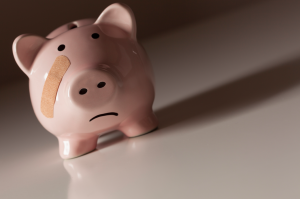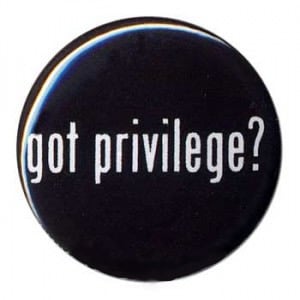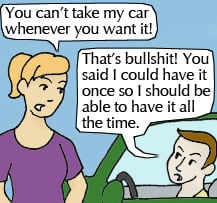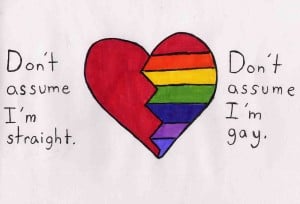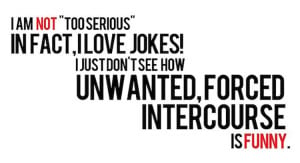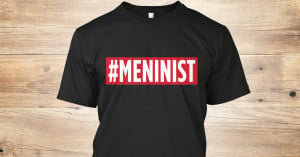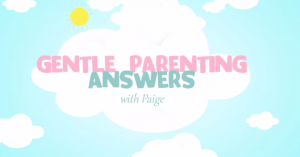The Canadian campaign Humans for Humans recently launched this video in the hopes of spreading empathy and awareness for the homeless population.
Go ahead, click on the video. I’ll wait.
You done? Cool. Because that was a test.
Personally, I teetered between moved and horrified as I watched. While I gave props to the campaign for their attempts to better educate housed people about the awful assumptions made on homeless people, I was nonetheless disgusted by their strategy.
Think about it. Housed people approached homeless people, gave them a device so expensive that it could’ve paid for both a month’s rent and a month’s worth of food, and asked them to use it in order to read the terrible things housed people have been known to say about homeless people. And then stand there and record while they cried.
I mean, talk about kicking someone while they’re down.
But the amount of people that shared this video on Facebook with tears in their eyes baffled me. Did nobody else see this problem?
Actually, yes. One person did. And wouldn’t you know it, she was the only other person who categorized herself as poor. Everybody else was middle class or above.
Which is point #1 of my little intro here.
You see, if you watched this video and did not independently come up with the worry of how this strategy was in fact implemented, that’s a red flag that you may have a classist mindset.
You didn’t see yourself as the poor/impoverished/homeless person on screen. You only saw yourself, the housed person. The objectifier. Just because such an approach is passively classist doesn’t make it any less classist.
And then there’s point #2: the actively classist person, the ones who made ridiculous comments such as “I’d feel bad for them if homelessness wasn’t a choice” even after watching the video.
It’s active classism that I’m going to focus on today – the people who look at any level of poor and declare it wrong or disgusting or lazy.
Granted, this is purely an intro article. There were actually so many classist beliefs that popped up in my brain that I struggled to pare them down to just a handful that hopefully give a taste of classism in the realms of school, work, food, home, and personality.
The following five classist assumptions aren’t expected to change the world, but they are hoped to start helping you notice how rampant classism is.
1. School Realm: Someone’s Project Being Less Aesthetically Pleasing Than Yours Means They’re Not As Serious About Their Education
Oh, school projects. You were the bane of my existence.
When a diorama or three-point poster board or mandatory science fair was assigned, the rich kids would head off to Staples. The poor kids would just groan.
Not only do we never have the money for the bits and baubles that go with a physical presentation, but we also don’t have our parents or legal guardians there to help us with it (or do it for us entirely).
Why? Because they’re working their second shifts so we can freaking eat.
And depending on our age, we may be working after school, too. We may have time to write a report, but we don’t have time to make it look visually appealing on top of it.
Teachers, please stop assigning these sorts of things.
They’re unnecessary flourishes that not only don’t enhance a child’s education, but directly compromise poor kids’ grades, aiding in the perpetuation of that self-fulfilling prophecy about poor people being not good enough for a college education.
2. Work Realm: Someone’s Attire Being Off-Brand or Lacking in Variety Means They Don’t Care About Their Appearance
Women get this one particularly bad since our society is still obsessed with women’s clothes defining who they are. Because—you know—objectification.
Look, clothes cost money, especially brand-name clothes. Few poor people have a unique ensemble for every day of the month.
Despite how well we take care of our clothes – because we respect how expensive they are – we may have to wear the same pair of pants several times in the same week. Which I guess is part of the reason we take such good care of them. We need them to last.
This classist belief is one of the many reasons poor people aren’t able to get good-paying jobs: Physical appearances end up being part of the job description.
And if you’re incapable of wearing a different Saint Laurent—yeah, I just Googled that—skirt every day, you’re fired.
Nothing to do with hygiene, nothing to do with your productivity. Just because you don’t look as fancy as everyone else.
3. Food Realm: Someone Who Doesn’t Eat Organically or in a ‘Healthy’ Way Means They’re Lazy or Don’t Care About Their Health
Have you ever compared prices between organic and non-organic food? Organic food is expensive as hell.
If you’re able to afford an organic diet, you have financial privilege and have no right to lord that fact over poor people under the guise of shaming us.
We don’t care about our health because we have less money than you do? That’s a logical fallacy. And just plain elitist.
Also, healthy food in general. This usually is categorized under the fruits and vegetables department. To make this point quick, poor people often get their (minimal) paychecks only once a month, which means that money needs to last for 30 days food-wise. And we don’t exactly have a lot of time to go to the grocery store what with our multiple jobs and all, so we often buy for an entire month.
In other words: preservatives, preservatives, preservatives. They’re our best friends.
Without them, we often wouldn’t be able to eat at all. Or at least risk giving ourselves some serious food poisoning, which wouldn’t bode well for keeping our jobs.
And don’t get me started on the restrictions of what you can and can’t buy with food stamps. I need to leave that for another day.
4. Home Realm: Homelessness Is a Choice (Or Always the Fault of the One Who Is Homeless)
Bullshit.
You know what causes homelessness? Not having a home.
You know what causes not having a home? Being dealt a raw hand with no luck to help make it better.
Breadwinners die. People of color don’t get callbacks because of their “exotic” sounding names. LGBTQIA+ kids get kicked out by bigoted families. Trans people get fired because they’re—you know—trans.
Shit happens.
And when it happens, there isn’t always going to be someone around to catch you.
In poor world, you’re surrounded by other poor people. And as much as we like to help each other out, sometimes we just plain can’t.
So please don’t look down at homeless people from your place of wealth and luck, wondering why they can’t get off their lazy behinds and work up to what you have.
Because you didn’t work up to what you have, either. Not from the point of homelessness or poverty, anyway. It’s a huge difference.
Have you ever tried filling out a job application when you have no home address, phone number, or e-mail? Yeah, good luck with that.
5. Personality Realm: Someone Who Doesn’t Partake in the Ego Dance is Rude
Something really weird happens if you get past an hourly wage job: You realize people suddenly have the time to…waste time. And yet they still call it work.
No, I’m not talking about how many hours you can get away with watching cat videos or browsing Facebook while in your cubicle. I’m talking about people who have the ability in their days to figure out how to disagree with someone without coming off like they’re disagreeing with them. Because apparently that hurts people’s feelings, to be corrected or questioned ever.
I’m not sure if there’s a term for this, so I’ve started calling it the ego dance. And most of us poor people just don’t get it.
“I think that’s a wonderful idea, Betsy. It’s smart, sophisticated, and clearly shows the thought you’ve put into enhancing this project. You’re a valued member of this team, and we could never ask for anyone better. However, your suggestion to reintroduce anthrax via Fisher Price toys seems it might err on the side of being less than adequate for the general populace that utilizes our string of daycare centers. While I’m totally on board with you, we have to think of our shareholders. But never fear! You’ll find a bonus with your next paycheck as thanks for your dedicated time and effort.”
…Huh?
Poor people are used to constantly being on the move, constantly working or looking after children or figuring out which bill absolutely must be paid first. We don’t have time for small talk, ego dances, or worrying about thin-skinned rich folk.
No, time is money. Which means we can often be blunt, direct, or otherwise socially efficient with our days.
But is this rude? Hardly.
Just because we gave you the constructive criticism you required without also taking ten minutes to assure you that you’re still a wonderful human being doesn’t mean we’re coldblooded. It just means we can’t be your impromptu therapist.
That’s a role best left for—you know—an actual therapist. Be good to your brain, m’kay?
***
So you’re looking at this list and going, “Okay, James. If these assumptions really are classist, then why are they so prevalent?”
Good question, grasshopper! I was hoping you’d ask!
See, there’s one distinct trend in all of these classist assumptions: They’re presented in a way that suggests they’re choices.
Don’t eat healthy? It’s because you chose to not care about your health. Don’t dress fashionably? It’s because you chose to not care about your appearance. Don’t make the greatest diorama ever? It’s because you chose to not care about your education.
That’s really the inspiration behind any hateful “ism.” It’s always fear or miseducation or confusion. And for classism, it’s the worry that poverty could happen to you.
Those aren’t small potatoes. It’s a very real and very scary thought. I completely hear you on that.
So how does one combat it? Well, the smart answer would be to ensure things like livable minimum wages, equal pay among genders, and universal healthcare. But the easy answer is simply to conclude that poverty is a choice.
Because if it’s a choice and you choose to not want it, then it can’t happen to you, right? No matter how serious that cancer diagnosis is, no matter how suddenly the CEO fires you due to cutbacks, no matter how badly you get caught up in an identity theft web.
But seriously, just be aware of what’s actually a choice and what isn’t.
By recognizing poverty choices (or lack thereof), we could start moving toward fixing the issues, which would not only help poor people be less poor, but create more of a safety net for yourself if and when unfortunately things happen in your life.
Basically, being less classist will just plain help everyone.
[do_widget id=”text-101″]
James St. James is a Contributing Writer for Everyday Feminism. He isn’t particularly fond of his name, but he has to admit it makes him easier to remember. When he’s not busy scaring cis gender people with his trans gender agenda, he likes to play SEGA and eat candy. Follow him on Twitter @JamesStJamesVI.
Search our 3000+ articles!
Read our articles about:
Our online racial justice training
Used by hundreds of universities, non-profits, and businesses.
Click to learn more


